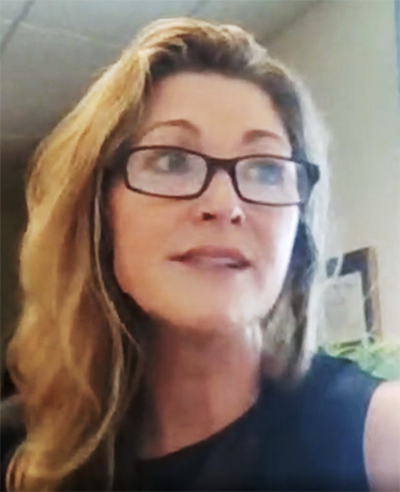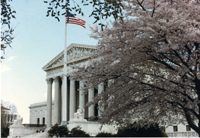
This is part two of the blog series, The Right to Privacy in Modern Discovery: a review of another great law review article. See here for Part 1. This blog series considers the interplay between privacy and civil discovery as discussed in the law review article by Professor Allyson Haynes Stuart, entitled A Right to Privacy for Modern Discovery, 29 GEO. MASON L. REV. (Issue 3, 2022). The blogs are supplemented by Allyson’s written comments and video interviews.
In Part Two we complete review of the article, plus share Professor Stuart’s supplementary comments and videos. They will address criminal law considerations and the impact of the Supreme Court’s bombshell case rendered in draft and then final form after her article. Dobbs v. Jackson Women’s Health Organization, 597 U.S. _ (2022). The Professor’s unexpected comments are somewhat hopeful, at least in so far as civil e-discovery is concerned.
Supreme Court on Privacy and Technology
Next up in our review of Professor Stuart’s law review is subsection B. Supreme Court Case Law on Privacy and Technology of Section II. Privacy in Modern Discovery. She starts off with a good summary of civil discovery law.

Under the discovery rules, there is no concept of “reasonable expectation of privacy.”267 A diary entry is perfectly discoverable if it is relevant.268 A statement shouted from a rooftop is not discoverable if irrelevant. Instead, the rules speak in terms of privilege.269 Federal courts recognize that privacy interests are implicated in the discovery rules and that courts should protect privacy interests as part of their issuance of protective orders,270 but do not treat discovery as constrained by the Fourth Amendment. However, concepts of privacy have inevitably overlapped. Many courts refer to “expectations of privacy” in the context of civil discovery.271
She then discusses the series of Supreme Court cases noting how technology today has changed privacy analysis in criminal cases and then concludes subsection B as follows:
Under the discovery rules, there is no concept of “reasonable expectation of privacy.”267 A diary entry is perfectly discoverable if it is relevant.268 A statement shouted from a rooftop is not discoverable if irrelevant. Instead, the rules speak in terms of privilege.269 Federal courts recognize that privacy interests are implicated in the discovery rules and that courts should protect privacy interests as part of their issuance of protective orders,270 but do not treat discovery as constrained by the Fourth Amendment. However, concepts of privacy have inevitably overlapped. Many courts refer to “expectations of privacy” in the context of civil discovery.271
A Modern Framework for Privacy Protection in Discovery
The next subsection is C., A Modern Framework for Privacy Protection in Discovery. Here Allyson Stuart lays out her proposal for reform of civil discovery. Here is the summary she provides in the opening paragraph.
First, privacy rights in discovery are protected by the Constitution when requests touch on personal, intimate matters, or implicate rights to association like donor or membership lists, and are protected by public policy when they implicate state or federal statutory confidentiality provisions. Second, when such privacy rights are implicated, courts should require a higher showing of relevance as opposed to discovery that is solely for purposes of impeachment or is otherwise “collateral.” Courts should apply higher limits still when private information is sought from or implicates the rights of third parties. And third, even where information sought does not fall within traditional notions of confidentiality or constitutional zones of intimacy, the totality of what is comprised within broad sets of data may implicate privacy pursuant to the mosaic theory. All three of these bases for restriction are proper subjects for arguments that discovery is not proportional under Rule 26(b), or should be protected under Rule 26(c).
I urge you to read the full article for her complete argument for this new framework for privacy protection in discovery. A Right to Privacy for Modern Discovery, 29 GEO. MASON L. REV. (Issue 3, 2022).
Professor Allyson Stuart’s Conclusion
After the framework discussion and argument in the article, comes the all important conclusion. It is excellent, so I reproduce it in full, again to entice you to read the whole article.
As in the Fourth Amendment context, discovery has been upended by changes in technology. Information that was not capable of creation is now saved automatically in vast databases. Formerly private communications are now shared in semi-public fora. People’s movements, bodily functions—indeed, their entire lives—are chronicled by devices on their wrists or their countertops. Courts can and should apply privacy protections when this data is sought in discovery.
Text messages and other communications may be private if they implicate personal relationships or otherwise intrude on the zone of intimacy. Fitbit data intrudes on privacy of medical and other personal information, and may include GPS data that gives a detailed record of a user’s activity every day. Social media account information too could offer a detailed portrait of a user’s life, and could implicate associational and other constitutional privacy rights. Finally, all of these discovery requests risk the privacy of third parties. These considerations are appropriate for a court in balancing the need for the discovery—including how relevant it is to the claim—against the intrusion into the privacy of the party and others. The law gives courts the discretion to say this comprehensive, intrusive discovery is not proportional.
Privacy in the Context of Criminal Discovery
I asked Allyson Stuart to comment on an issue slightly outside of her article, but related, namely privacy in criminal discovery. I wrote about this recently in a lengthy blog series, Examining a Leaked Criminal Warrant for Apple iCloud Data in a High Profile Case, Part One, Part Two and Part Three. She later read this series, but before that, commented generally on privacy in the context of criminal discovery. Again, I share these comments from a private email with her permission:
One thing that I find interesting is the idea that the Fourth Amendment should apply to civil discovery. I cite at least one article making that argument in my article. Otherwise there is certainly more robust protection under the Fourth Amendment than under interpretation of Rule 26. In particular, Jones, Riley and Carpenter do a good job with changing technology in the 4th A. context.
Professor Stuart and I also discussed by video the Fourth Amendment’s indirect impact on civil discovery. Again, here is our chat shared with her permission.
My blog series Examining a Leaked Criminal Warrant for Apple iCloud Data in a High Profile Case concerned the leak of a criminal warrant that was filed under seal and was supposed to remain secret. The public posting of the secret warrant on Pacer appears to have been an accident, a major blooper to be sure. My article discusses the dangers posed to both civil and criminal suits by wide-spread public access to Pacer. Also see: The Sedona Conference Commentary on the Need for Guidance and Uniformity in Filing ESI and Records Under Seal. My concerns about Pacer are broad-based: First Amendment rights, individual privacy rights, privacy rights of individuals under investigation, the rights of criminal investigators for unimpeded discovery of the truth, and the rights of litigants to preserve trade-secrets and other confidential information. Professor Stuart agreed generally with these comments on Pacer in my article, stating in correspondence, which, again I have permission to publish:
Wow, what a blunder. And I think for all the reasons you mention this makes it more important than ever to limit private material at the front end. Sealing or confidentiality can be problematic. TMZ has a field day when anything shows up involving celebrities (not that I am particularly sorry for them). But the whole “practical obscurity” of court filings is clearly a thing of the past, and the federal government moves so slowly when it comes to technology.
The recent case concerning a normally secret criminal warrant against a past President, one that has high First Amendment values for that reason, is instructive on litigants privacy, Pacer and balancing privacy interests against the public’s right to know. In re Warrant, No. 22-8332-BER, 2022 U.S. Dist. LEXIS 150388 (S.D. Fla. Aug. 22, 2022). Motions to unseal the warrant were brought by almost every major news organization in the world as Intervenors and opposed by DOJ. On August 22, 2022, Magistrate Judge Reinhart ordered the Warrant to be unsealed, but only after the DOJ first had an opportunity to suggest redactions. He imposed a deadline of August 25, 2022, for the DOJ to file, under seal, the warrant with redactions. His reasoning is very timely and instructive:
Despite the First Amendment right of access, a document can be sealed if there is a compelling governmental interest and the denial of access is “narrowly tailored to serve that interest.” Globe Newspaper Co. v. Superior Court, 457 U.S. 596, 606, 102 S. Ct. 2613, 73 L. Ed. 2d 248 (1982). . . .
The Government argues that unsealing the Affidavit would jeopardize the integrity of its ongoing criminal investigation. The Government’s motion says, “As the Court is aware from its review of the affidavit, it contains, among other critically important and detailed investigative facts: highly sensitive information about witnesses, including witnesses interviewed by the government; specific investigative techniques; and information required by law to be kept under seal pursuant to Federal Rule of Criminal Procedure 6(e).” ECF No. 59 at 8. . . .
After weighing all the relevant factors, I find that the Government has met its burden of [*16] showing good cause/a compelling interest that overrides any public interest in unsealing the full contents of the Affidavit. . . . I must still consider whether there is a less onerous alternative to sealing the entire document. The Government argues that redacting the Affidavit and unsealing it in part is not a viable option because the necessary redactions “would be so extensive as to render the document devoid of content that would meaningfully enhance the public’s understanding of these events beyond the information already now in the public record.” ECF No. 59 at 10; see also Steinger, 626 F. Supp. 2d at 1237 (redactions not feasible because they would “be so heavy as to make the released versions incomprehensible and unintelligible.”). I cannot say at this point that partial redactions will be so extensive that they will result in a meaningless disclosure, but I may ultimately reach that conclusion after hearing further from the Government. . . . I therefore reject the Government’s argument that the present record justifies keeping the entire Affidavit under seal.
Id. at *15
On August 26, 2022, the judge approved the redacted warrant and it was unsealed and opened to public view. I then was able to immediately download a copy and post it on my blog, FULL TEXT OF THE OFFICIAL COURT REDACTED SEARCH WARRANT AGAINST DONALD TRUMP.
Dobbs v. Jackson Women’s Health Organization
I also asked Professor Stuart to address for my readers the limited topic of what Dobbs has done to the right to privacy in discovery. She is currently working on a full article on this important subject. So please take this short comment as something of a teaser. I will let you know when the full article is released. Her full essay will look more generally “at how far the Dobbs decision goes to eroding not just the right to choose but the more general right to privacy that Roe found implicit in the Constitution.” Stuart, private correspondence with Losey, August 2022. In the meantime, here is her comment on Dobbs.
In sum, Dobbs most directly threatens the right to privacy in the sense of autonomy and decision-making. It is less of a threat to the privacy of information. This conclusion is buttressed by the decision by the Court in the previous term striking a California statute that required disclosure of donor information, Americans for Prosperity Foundation v. Bonta, 594 U.S. __ (2021). While grounded in the First Amendment’s freedom of association, the opinion gives broad support to privacy concerns respecting anonymity in relation to “sensitive causes.”
Professor Stuart, Id.
Professor Stuart was kind enough to create a video for us that further explains this distinction and the impact of Dobbs.
Stay tuned for Part 3 coming soon with the Conclusion of this series. I will make specific suggestions for how to build upon the important work of Professor Stuart in privacy and discovery, including yet another revision to Frankenstein Rule 26, and how the EDRM, The Sedona Conferences and other organizations can help.
Ralph Losey Copyright 2022 – ALL RIGHTS RESERVED


